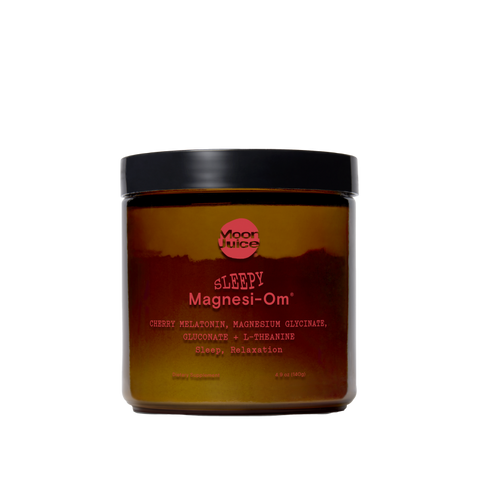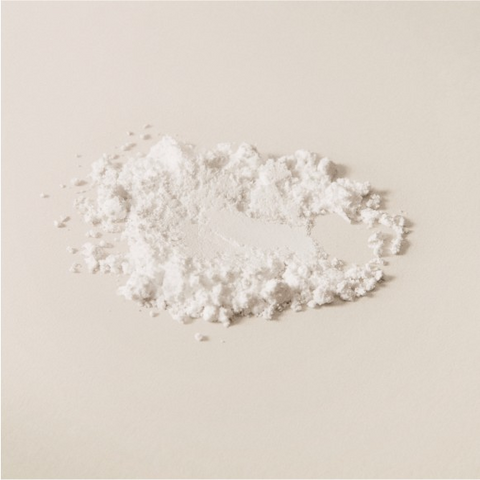The importance of a good night’s sleep and a proper circadian cycle can’t be overstated, and sometimes, a natural sleep supplement is needed to help us reach those goals. Ashwagandha and Melatonin are two distinct supplements used as sleep solutions, but they work in different ways.
Melatonin is a hormone that directly regulates the sleep-wake cycle and is effective for immediate sleep support, though it should be used cautiously over a long period. On the other hand, Ashwagandha, an adaptogenic herb, may gradually improve sleep by promoting relaxation and reducing stress, helping to calm the mind for sleep. While Melatonin acts quickly, Ashwagandha's effects on sleep are more subtle and may also energize some users.
If you want to weigh the benefits of Ashwagandha vs. Melatonin, here’s everything you’ll need to know.
Understanding Ashwagandha vs. Melatonin
Sleep and stress go hand in hand, one affecting the other. So, when it comes to taking an overall stress supplement like Ashwagandha or Melatonin to help you achieve improved sleep, here’s what you need to know.
What is Ashwagandha?
Ashwagandha, scientifically known as Withania somnifera, is an ancient flowering herb that’s been relied on heavily in traditional Ayurvedic medicine for centuries as a harmonizing plant. Native to India, Nepal, and parts of Africa, this shrub is known as an adaptogen, meaning it can help the body adapt to stress. In clinical studies, it was shown that Ashwagandha helps reduce stress and regulate the stress hormone cortisol, while also helping to enhance focus and mental stamina while reducing irritability and stress-related cravings.
Ashwagandha’s health benefits are plentiful. Early research suggests that the herb can help improve mood, enhance stamina and endurance, boost brain function, benefit sex drive, and nourish hair.
Several studies have shown that Ashwagandha root can help improve sleep quality, especially in those with difficulty sleeping or insomnia, as well as mental alertness and moodiness in the mornings—the flip side to a good night’s sleep.
This herbal supplement is available in various forms, including Ashwagandha powders, capsules, and liquid extracts made from the roots and orange-red fruit of this plant.
What is Melatonin?
Melatonin is a natural compound that’s produced by various organisms, including humans. This hormone is produced in our pineal gland, a small pea-sized gland in the brain, in response to darkness. It plays a crucial role in regulating the sleep cycle, signaling to the body that it’s time to wind down and prepare for sleep.
Influenced by the amount of your exposure to light, Melatonin levels typically rise in the evening, increasing in response to darkness and then decreasing in response to light.
In addition to its role in circadian rhythms, helping your body transition to restful sleep, Melatonin is also a powerful antioxidant, even more potent than vitamin E in helping protect cells from damage caused by free radicals.
Is Melatonin or Ashwagandha Better for Sleep?
Both Melatonin and Ashwagandha are used to promote good sleep, but they work in different ways and may be better suited for different sleep issues.
- When to choose Melatonin for sleep: Because Melatonin regulates your sleep-wake cycles, taking a Melatonin supplement can be particularly effective for people who are dealing with circadian rhythm issues like jet lag or shift work. It can also help with occasional sleep disturbances, such as insomnia related to travel or occasional stress.
- When to choose Ashwagandha for sleep: Ashwagandha, on the other hand, won’t help put you to sleep, but it can indirectly improve sleep quality as an adaptogen that helps the body manage stress. Because it’s hard to get to sleep when your cortisol levels are elevated and you have a lot on your mind, Ashwagandha may be more beneficial for people whose sleep issues are related to daily stress. As one of the best adaptogens for stress, Ashwagandha is a great dietary supplement to help reduce cortisol levels. Because Ashwagandha won’t cause drowsiness or put you to sleep, it’s also suitable to take in the morning.
Key Differences Between Ashwagandha & Melatonin
Both are used for better sleep, but that doesn’t mean they’re interchangeable. Here’s what to know about the differences between these two natural sleep supplements.
Mechanism of Action
For starters, Ashwagandha and Melatonin each work in different ways to promote better sleep. It’s hypothesized that adaptogens like Ashwagandha work via two master control systems: the HPA-axis (hypothalamic-pituitary-adrenal axis) and the SAS, or sympathoadrenal system, which you might remember as the fight-or-flight response.
Conversely, Melatonin acts on receptors in the brain to regulate your circadian rhythm. It’s the same mechanism at play that makes you drowsy when it’s dark out. Like your natural Melatonin, the supplemental kind helps signal to your body that it’s time for bed, thus making it easier for you to fall asleep.
Efficacy
Both Ashwagandha and Melatonin supplements have been shown to have an effect on sleep. In a placebo-controlled study that looked at 58 participants, those who took 250 or 600 mg of Ashwagandha not only felt lower stress, but also reported significantly better quality of sleep compared to those in the placebo group.
Another study of 60 senior adults found that those taking 600 mg of Ashwagandha daily for 12 weeks experienced significantly better sleep (and felt more mentally alert in the mornings) compared to the control group.
Melatonin has been clinically shown to help you fall asleep—but many sleep supplements can actually be too effective, causing a “Melatonin hangover” effect the next day. Many people complain that Melatonin makes them groggy the next day —good for the sleep part of the sleep-wake cycle, but not so good for the wake part.
That’s because your body only needs low levels of Melatonin to regulate your circadian rhythms, but many Melatonin supplements far exceed that amount. Higher-dose supplements with 1-5mg of Melatonin can put you outside of your natural range, flooding your brain receptors. For just the right amount, opt for a microdose of Melatonin, like the one in Sleepy Magnesi-Om®.
Usage
You can take Ashwagandha at any time of the day. Consistency is key, so take this adaptogen whenever it is likely to stick. Many people like to start their day with Ashwagandha in their coffee, tea, smoothies, or daily vitamins.
It’s best to take Melatonin before bedtime to help you fall asleep and get into a good groove with your circadian rhythm. However, you might want to avoid taking Melatonin every night. If you’re taking Melatonin to help with shift work, take it before going to sleep but never before you drive home for the night since its sedative effects could lessen your driving ability.
Side Effects
When a too-high dose of Melatonin floods your brain receptors and creates up to 100x the natural amount of Melatonin in your blood, that’s where the “hangover” comes in. Melatonin’s side effects can include dizziness, drowsiness, weird dreams, and headaches. Some might experience nausea or irritability. So how much Melatonin should you take? A “microdose” of Melatonin can be the perfect sleep aid to help reset your rhythm while minimizing any potential side effects.
Some people may be more sensitive to Melatonin, so talk to your doctor before adding it to your routine.
Ashwagandha root is generally considered a gentle herb, but its mild side effects can include upset stomach, nausea, or drowsiness.

Can You Take Ashwagandha With Melatonin?
Yes, you can take Ashwagandha with Melatonin since there aren’t any known interactions between the two. However, it’s always a good idea to talk to your doctor or holistic healthcare provider before starting a new dietary supplement if you’re on other medications, are pregnant, or have underlying health conditions or questions.
You may want to take Ashwagandha daily as an overall stress supplement or harmonizing herb and Melatonin as needed to target more situational sleep problems, such as postpartum, a time change, or a new schedule.
Ultimately, the choice between Melatonin and Ashwagandha will depend on the underlying cause of your sleep issues. If you could benefit from overall stress reduction that’s impacting your sleep, Ashwagandha might be a better option. But if you have trouble falling asleep because of disruptions to your circadian rhythms, like shift work or jet lag, a gentle Melatonin supplement might be for you.
Unlike higher dose Melatonin that can leave you groggy in the morning, Sleepy Magnesi-Om® supports slumber without the hangover. This Magnesium and Melatonin supplement has a microdose of Phytomelatonin extracted from plants, blended with non-laxative Magnesium and L-Theanine to decrease the amount of time it takes you to fall asleep, support sleep quality, and support your body’s relaxation and stress response.
Sources
- National Library of Medicine, An Overview on Ashwagandha: A Rasayana (Rejuvenator) of Ayurveda. https://www.ncbi.nlm.nih.gov/pmc/articles/PMC3252722/
- National Library of Medicine, Efficacy and Tolerability of Ashwagandha Root Extract in the Elderly for Improvement of General Well-being and Sleep: A Prospective, Randomized, Double-blind, Placebo-controlled Study. https://www.ncbi.nlm.nih.gov/pmc/articles/PMC7096075/
- National Library of Medicine, Efficacy of Different Concentrations of Withanolides in Ashwagandha Supplements for Insomnia and Enhancing Energy Levels. https://www.ncbi.nlm.nih.gov/pmc/articles/PMC9194423/
- Antioxidants | Free Full-Text | Is Melatonin the Cornucopia of the 21st Century? Ashwaganda and melatonin Interactions - Drugs.com. https://www.mdpi.com/2076-3921/9/11/1088
















